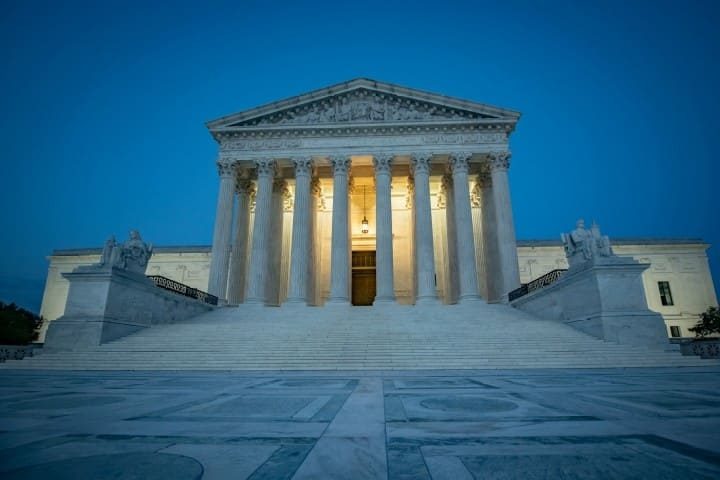
The U.S. Supreme Court has declined to hear a transgender student’s case, handing the plaintiff a victory but leaving the issue of transgender bathroom access open to future challenges.
The court’s denial of certiorari allowed the lower court ruling to stand in favor of Gavin Grimm — a biological female identifying as a male — who sued the Gloucester County (Virginia) School Board for barring her from using the boys’ restroom. The court ruled in 2020 that denying the then-teenager access to the boys’ bathroom would amount to a violation of her civil rights under Title IX of the Education Amendments of 1972.
The Supreme Court denied the school board’s petition on Monday without explanation, but noted that Justices Samuel Alito and Clarence Thomas were in favor of hearing the case.
The American Civil Liberties Union (ACLU), which represented Grimm, celebrated the decision. “This is an incredible victory for Gavin and for transgender students around the country,” said Josh Block, a senior staff attorney.
Grimm said she is glad the legal fight is over. “Being forced to use the nurse’s room, a private bathroom, and the girl’s room was humiliating for me, and having to go to out-of-the-way bathrooms severely interfered with my education,” she said. “Trans youth deserve to use the bathroom in peace without being humiliated and stigmatized by their own school boards and elected officials.”
Grimm first sued her Virginia high school in 2015 after it changed its bathroom policy to prohibit her from using a bathroom aligned with her “identity,” instead directing her to use a unisex one.
The teen — who graduated in 2017 — alleged her school’s policy violated the Equal Protection Clause of the U.S. Constitution and Title IX that bans discrimination on the basis of sex in schools. The Supreme Court initially agreed to hear the case in 2016, after a lower appeals court ruled in Grimm’s favor. In ruling in Grimm’s favor, the appeals court cited an Obama-era Education Department letter that said “a school generally must treat transgender students consistent with their gender identity.”
In 2017, the Trump administration rescinded the Obama-era policy, arguing that states and public schools should have the authority to make their own decisions without federal interference, and directed schools to allow students only to use bathrooms appropriate for their biological gender. Following the change, the Supreme Court decided to send the case back to the lower court to reconsider the issue in a context of the new policy.
The 4th U.S. Circuit Court of Appeals ruled in favor of Grimm in August 2020, and Virginia’s Gloucester County School Board asked the Supreme Court to reconsider the case in February, after the Biden administration had reinstated the “anti-discrimination” policy that President Donald Trump had revoked.
The Biden administration issued a letter earlier this month stating that it would consider these protections as applying to students, just as the Obama administration did. “A school’s policy or actions that treat gay, lesbian, or transgender students differently from other students may cause harm,” the legal memo from the Department of Education said.
However, this policy sets the Biden administration up for a confrontation with Republican-run states, where 26 state legislatures introduced 41 bills in just the first two months of 2021 to exclude trans youth from school sports teams that do not align with their biological sex, per an ACLU tracker. Eight of them — Arkansas, Mississippi, Montana, South Dakota, Alabama, West Virginia, and Tennessee — have signed such bills into law.
With these state laws opposing federal policy, more cases will likely soon come before the Supreme Court — and there are many of them already.
“Clearly, there’s a huge split in the country,” said Emilie Kao, director of the Heritage Foundation’s DeVos Center for Religion & Civil Society. “There have been over 100 bills brought in the state legislatures to protect privacy, safety and fairness by using biological sex as the basis for policies in schools.”
“I’m somewhat optimistic that the court will take a case that raises the issue in the next year or so,” believes Gail Heriot, a professor at the University of San Diego School of Law.
Unless President Biden and the Democrat Congress succeed in passing the so-called Equality Act that would legally enshrine “sexual orientation” and “gender identity” as protected characteristics under Title IX, and penalize everyday Americans for their beliefs about marriage and biological sex, the Supreme Court, by ignoring cases such as that of Grimm, will be de facto making the laws on the rights and privileges of people suffering from a mental condition known as recently as 2013 as “gender identity disorder.”




